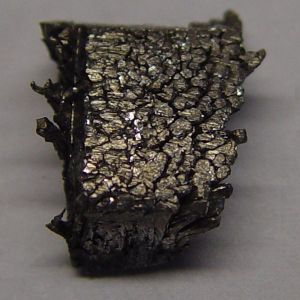Thulium
 |
This article is a stub. Please help Sciencemadness Wiki by expanding it, adding pictures, and improving existing text.
|
 A piece of thulium metal from IrC's collection. | |||||
| General properties | |||||
|---|---|---|---|---|---|
| Name, symbol | Thulium, Tm | ||||
| Appearance | Silvery-gray | ||||
| Thulium in the periodic table | |||||
| |||||
| Atomic number | 69 | ||||
| Standard atomic weight (Ar) | 168.93422(2) | ||||
| Group, block | , f-block | ||||
| Period | period 6 | ||||
| Electron configuration | [Xe] 4f13 6s2 | ||||
per shell | 2, 8, 18, 31, 8, 2 | ||||
| Physical properties | |||||
| Silvery-gray | |||||
| Phase | Solid | ||||
| Melting point | 1818 K (1545 °C, 2813 °F) | ||||
| Boiling point | 2223 K (1950 °C, 3542 °F) | ||||
| Density near r.t. | 9.32 g/cm3 | ||||
| when liquid, at | 8.56 g/cm3 | ||||
| Heat of fusion | 16.84 kJ/mol | ||||
| Heat of | 191 kJ/mol | ||||
| Molar heat capacity | 27.03 J/(mol·K) | ||||
| pressure | |||||
| Atomic properties | |||||
| Oxidation states | 2, 3 (a basic oxide) | ||||
| Electronegativity | Pauling scale: 1.25 | ||||
| energies |
1st: 596.7 kJ/mol 2nd: 1160 kJ/mol 3rd: 2285 kJ/mol | ||||
| Atomic radius | empirical: 176 pm | ||||
| Covalent radius | 190±10 pm | ||||
| Miscellanea | |||||
| Crystal structure | hexagonal close-packed (hcp) | ||||
| Thermal expansion | 13.3 µm/(m·K) (poly) | ||||
| Thermal conductivity | 16.9 W/(m·K) | ||||
| Electrical resistivity | 676 Ω·m (at 20 °C) (poly) | ||||
| Magnetic ordering | paramagnetic (300 K) | ||||
| Young's modulus | 74 GPa | ||||
| Shear modulus | 30.5 GPa | ||||
| Bulk modulus | 44.5 GPa | ||||
| Poisson ratio | 0.213 | ||||
| Vickers hardness | 470–650 MPa | ||||
| Brinell hardness | 470–900 MPa | ||||
| CAS Registry Number | 7440-30-4 | ||||
| History | |||||
| Naming | after Thule, a mythical region in Scandinavia | ||||
| Discovery and first isolation | Per Teodor Cleve (1879) | ||||
Thulium is a lanthanide with the symbol Tm and the atomic number 69. Thulium is the second-least abundant of the lanthanides, after radioactively unstable promethium which is only found in trace quantities on Earth.
It is often considered by many chemists a useless element, because it's rare and expensive, and the other more available lanthanides have similar physical and chemical properties.
Contents
Properties
Chemical
Thulium metal is a reducing agent and is reactive towards acids and oxidizers. Most ionic thulium compounds are soluble except for the fluoride and the nitrate.
Thulium tarnishes slowly in air and burns readily at 150 °C to form thulium(III) oxide:
- 4 Tm + 3 O2 → 2 Tm2O3
Thulium reacts slowly with cold water and quite quickly with hot water to form thulium hydroxide:
- 2 Tm + 6 H2O → 2 Tm(OH)3 + 3 H2
Thulium reacts with all the halogens. Reactions are slow at room temperature, but are vigorous above 200 °C:
- 2 Tm + 3 X2 → 2 TmX3
Physical
Thulium metal has a bright, silvery luster. It slowly tarnishes in air and reacts with water. The metal is soft enough to be cut with a knife. Solutions containing thulium(II) ions often present a wine red coloration. Thulium(III) ions may fluoresce blue under shortwave UV light, though this has not been confirmed.
Availability
Thulium is more common than iodine on Earth, but it is hard to find and extremely expensive. One source for thulium, as well as other rare earth metals, is Metallium. It is sold in 1 gram, 5 gram and 25 gram sizes, as well as rods, ampoules, and coins. Metallium also takes custom orders. Thulium and its compounds may be occasionally found on eBay. Because the Tm(III) ion color is hard to distinguish from other ions, other lanthanides or metals in general may be sold as thulium. This is a common problem with lanthanides, and online sellers.
Occasionally you can find sellers on eBay, like this one.
Projects
- Blue fluorescence (used in Euro banknotes)
- Make ferrite ceramic materials
- Special solid-state lasers
Handling
Safety
Thulium has not been observed to have a biological role, but small amounts of soluble thulium salts stimulate metabolism. Soluble thulium salts are mildly toxic, but insoluble thulium salts are completely nontoxic.
Storage
Thullium should be stored in closed bottles, and kept away from moisture and any corrosive vapors, such as acids.
Disposal
Best to try to recycle it, as it's a rare and expensive material.